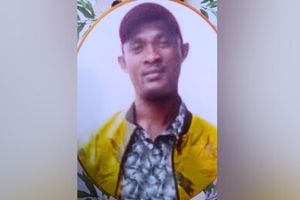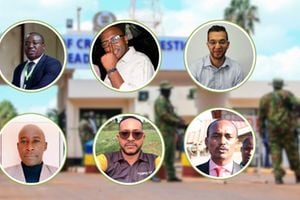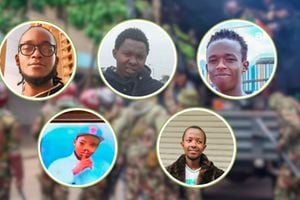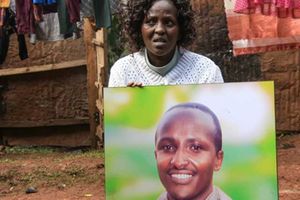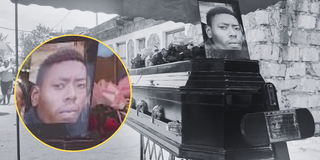
The coffin bearing the remains of Kennedy Mwaura Mwangi during the burial ceremony in Kabati town on September 18, 2024.
Kennedy Mwangi was among three unidentified men who were gunned down in Mutoho village last week. If you hadn't read our initial coverage of the story, you can do so here. After days of remaining unknown, the three men were later identified. Read about it here.
-------------
It was an open secret that Kennedy Mwangi made a living from crime, with most of his hits in Kiambu and Murang'a.
Born in Bendor Estate in Gatanga Sub County on September 5, 1993, he was orphaned aged 14. Mwangi and his four siblings were left in the care of his grandparents.
At 31– his last birthday being on September 5, 2024 – Mwangi had revealed to confidants that he wanted to change his ways and open a bar.
But there was a problem in honouring his 31st birthday resolution – capital.
“It had reached a point he was always on the run. He had become a marked man,” Mwangi’s cousin John Chege said.
“It was not even a month since leaving jail. Mwangi feared being with his wife and two children.”
He added that police cells, prisons and remand homes had become Mwangi’s residences from when he was 21.
Mr Chege said his heart sank when he read in the Daily Nation of September 11 about Mwangi being gunned down in Mutoho, on the Kenol-Murang’a road on September 9.
Mwangi was executed in the 9 pm incident alongside Francis Maingi, 47 and Michael Kimando by men believed to be police officers.
“I cried for it was very painful. Mwangi died at the entry point of his reformation. The turning point became his departure,” Mr Chege said.
“He had told me that he needed Sh300,000 to stop being an outlaw. Mwangi told me that he had one last plan that would help him get cash.”
Mr Chege told the Daily Nation that Mwangi left his (Chege’s) place on September 8 around 10 am.
“He said he was going to buy school uniform and a bag for his son. That was the last time I saw him alive,” he said.
The bodies of Mwangi and his two friends were taken to Murang’a County Hospital Mortuary by officers from Kenol police station.
A postmortem report filed at Kenol police station on Monday indicates that Mwangi was hit by seven bullets in the head, all at close range. The force of the bullets tore the flesh and crushed his skull, killing him instantly.
The other two were shot 10 times in the head, the report says.
Mwangi was baptised at the African Independent Pentecostal Church in 2002.
After completing Standard Eight, he began engaging in casual labour in Thika before securing part-time jobs at Pro Gas and Del Monte. Mwangi would later be introduced to the fast and furious lane of outlaws.
Murang’a South Directorate of Criminal Investigations chief John Kanda insists police had no hand in the killings.
Mr Kanda said he does not know who killed them “although I know the three were criminals on the run and who were planning to commit multiple felonies.”
“The three were residents of Kiandutu estate in Kiambu and were jailbirds. They had been charged with robbery with violence and rape on many instances but would find their way to freedom,” Mr Kanda said.
The statement elicited anger from the Law Society of Kenya, human rights activists, the National Congress Youths Alliance and Mwangi’s family members who now demand police accountability.
“This is a clear case of the nationwide extrajudicial killings by police officers. Mr Kanda is supposed to be named and shamed for negligence,” said Mr Geoffrey Kahuthu, an advocate of the High Court.
National Congress Youths leader Gladys Njoroge said: “Mr Kanda’s responses raise the million dollar question: If the three were not murdered by police, it means there is a militia in Murang’a County boldly and openly walking around with AK-47 rifles and killing people on busy roads.”
She said no ordinary gang can waste 27 bullets on three targets “unless Mr Kanda is confessing that Murang’a is a gangland...”
During Mwangi’s burial on the outskirts of Kabati town on Wednesday, Rev James Muigai said the deceased was well known to him.
“Do not be surprised to see me come to bury an outlaw. Mwangi cannot change as he is already gone. I leave judgment to God,” Rev Muigai said.
Mwangi’s wife Lydia Wangari eulogised him as “my super-hero despite the rumours.”
Ms Wangari said she cherishes the moments she shared with Mwangi “and the impact he had on my life.”
“I will raise our two wonderful children, knowing that you cannot be replaced by anyone. There will always be pain in my heart,” she said.
Mwangi’s grandfather, Joseph Muiru, said he would not dwell on the past.
“I lived with Mwangi in Thika and here. As a family, we cannot take responsibility for what he turned out to be. We brought him up in Christian ways and it was our prayer that he lived positively,” the elderly man said.
“What happened is in the past. I only advise young people to follow the law. We are here because of the bad choices Mwangi made but we cannot disown him. He is still family.”
Rev Muigai said Mwangi was remorseful at times.
“He desperately wanted to reform but we gather here to bid him farewell. Most importantly, we are here to preach the gospel of aspiring to do good at all times,” he said.
The preacher urged young people to fear God, serve Him and love peace “for that can make a big difference in determining how long you can live.”
“It is a shame that we bury young people these days as the elderly grow strong. I pray that God can have mercy on our youths to stop trying to get riches quiclky,” he said.
Rev Muigai consoled the family, saying justice for Mwangi may not be forthcoming “but God in his unlimited mercies knows what to do.”

